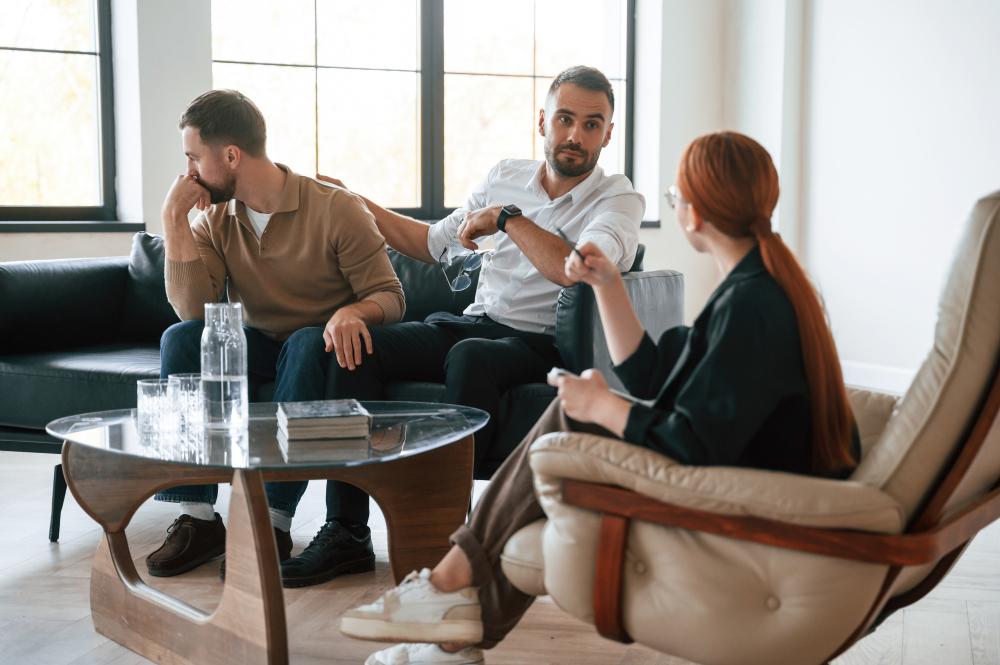The Essence of Group Therapy
In the heart of Whittier, group therapy serves as a lifeline for individuals grappling with depression and anxiety. Emphasizing shared experiences, this approach provides a unique setting where people can find solace and strength through a collective journey. At Solace Treatment Center, we have witnessed the profound impact this form of therapy has on building resilience and fostering a supportive community.
Group therapy offers a safe haven to explore emotions and develop coping strategies, all while sitting shoulder to shoulder with others who understand the struggle. Within this therapeutic space, the stigma often associated with mental health challenges begins to dissolve, replaced by mutual understanding and empathy.
Participants often find that hearing stories similar to their own can be both validating and enlightening. Just as importantly, sharing personal insights not only aids one’s recovery but also bolsters the healing journey of others. This reciprocal dynamic is what makes group therapy for depression and anxiety crucial in Whittier’s diverse community.
Professional Insight: A Therapist’s Perspective
With over 20 years in the field, I’ve observed that one of the most powerful elements of group therapy is the realization among clients that they are not alone. This awareness helps dismantle feelings of isolation, a common obstacle in both depression and anxiety. I recall a session where a participant, after weeks of silence, finally shared their story. The group’s genuine, encouraging response was transformative, highlighting the healing power of communal support.
Additionally, group therapy sessions introduce participants to a range of viewpoints and coping mechanisms. By interacting with diverse perspectives, individuals gain insights that may not emerge in one-on-one therapy. At Solace Treatment Center, we prioritize blending evidence-based practices with these personal revelations to create a holistic healing experience. Seeing participants uplift one another through shared triumphs and setbacks is a reminder of the strength in collective healing.
As a professional, witnessing such breakthroughs reinforces my belief in group therapy’s role in managing depression and anxiety. It offers an environment where therapeutic techniques are enriched by peer interaction, enabling a deeper exploration of self-awareness and emotional resilience.
The structured yet flexible nature of group therapy sessions in Whittier ensures that each meeting is tailored to meet the needs of its participants. Groups are often kept small to enhance intimacy and ensure everyone has a chance to speak and be heard, cultivating a sense of belonging and acceptance that is essential for healing.
Benefits, Challenges, and How They Intertwine
Group therapy for depression and anxiety in Whittier presents a myriad of benefits, yet it is not without its challenges. Among the benefits are enhanced social skills, emotional support, and the development of new coping strategies. A lesser-discussed advantage is the shared accountability that group settings foster, which can be particularly motivating for individuals struggling to maintain therapy commitments.
- Shared Experiences
- Peer Support
- Diverse Perspectives
- Accountability and Motivation
However, entering group therapy requires vulnerability, which can deter some from participating. It’s not uncommon for individuals to feel anxious about sharing personal stories in front of strangers. To address these concerns, we at Solace Treatment Center ensure that confidentiality is a cornerstone of every session, providing all participants with the assurance they need to open up authentically.
An additional challenge involves maintaining group dynamics that encourage participation from all members. Facilitators are adept at managing these interactions to ensure a balanced dialogue, helping participants feel included and valued. Group therapy sessions in Whittier are crafted to bring out the best in each attendee, with experienced therapists guiding the conversation toward constructive, empowering exchanges.
Why Choose Group Therapy for Depression and Anxiety Whittier?
Choosing group therapy for depression and anxiety in Whittier offers several unique advantages distinct to the area. The proximity to Los Angeles means access to a wide range of qualified mental health professionals. Solace Treatment Center, known for its comprehensive approach, ensures that group therapy sessions are led by experts trained to handle the nuances of group dynamics.
Moreover, Whittier’s vibrant community provides ample opportunities for social engagement outside the therapy room. The sense of belonging and community cohesion extends beyond therapy sessions, encouraging continued interaction and support among participants. Group activities and social gatherings organized by Solace Treatment Center further reinforce these connections, fostering an environment of continuous growth.
Embracing group therapy in Whittier means joining a diverse community dedicated to healing and personal development. The therapeutic process here is not just about addressing symptoms but nurturing relationships that inspire hope and resilience. The synergy between professional guidance and community support contributes to the effectiveness of group therapy for depression and anxiety Whittier has come to embrace.
What Can You Expect in a Typical Group Therapy Session?
In a typical group therapy session at Solace Treatment Center, participants can expect a safe, structured environment where each session builds on the last, fostering progressive healing and personal growth. Here’s what typically unfolds:
- Introduction: Each session begins with a brief check-in, allowing participants to share updates from their lives since the last meeting.
- Topic Discussion: The facilitator introduces a theme, often derived from common challenges faced by the group, guiding the conversation and offering insights.
- Interactive Activities: These may include role-playing, mindfulness exercises, or skill-building activities, designed to enhance therapeutic outcomes.
- Reflection and Sharing: Participants take turns sharing thoughts and feelings about the session’s topic, creating a dialogue that encourages empathy and understanding.
- Closing Ritual: The group concludes with a collective activity, such as a meditation or affirmation, aimed at reinforcing the day’s learning and leaving on a positive note.
This structured approach ensures each session is meaningful, nurturing a sense of progress and camaraderie among members. Through consistent participation, individuals learn to navigate their emotions effectively, supported by both peers and professionals.
Frequently Asked Questions
What Qualifies as a Group Therapy for Depression and Anxiety Whittier Emergency?
A group therapy emergency typically involves any situation where a participant is a danger to themselves or others, showing signs of severe distress or a crisis beyond what the group can handle. In such cases, immediate intervention by a mental health professional is crucial.
During a crisis, having established protocols is essential. At Solace Treatment Center, our facilitators are trained to recognize emergencies and take appropriate action, which may include pausing the session to provide individual support or reaching out to a crisis intervention specialist. The safety and well-being of every participant are always our top priority.
What are the primary benefits of group therapy for depression and anxiety in Whittier?
Group therapy for depression and anxiety offers a unique set of benefits that are particularly impactful for those in Whittier. At the core, it provides participants with a supportive environment where they can express their struggles openly without fear of judgment. This form of therapy fosters a sense of camaraderie and mutual understanding as individuals share similar experiences, which can be incredibly validating and empowering. Importantly, group settings also promote the development of social skills and coping mechanisms derived from collective wisdom. This dynamic reinforces personal growth and resilience, making it an effective therapeutic option.
Are there any misconceptions about group therapy that you frequently encounter?
Yes, a common misconception is that group therapy is not as effective as individual therapy. Some believe that less personal attention equates to less progress. However, what many don’t realize is the power of shared experiences and the collective support found in group settings. Participants often find that they gain new perspectives and insights from hearing others’ stories, which can lead to breakthroughs they might not achieve in one-on-one sessions. Additionally, confidentiality is a priority, ensuring a safe space for genuine interactions.
What advice would you give to someone anxious about sharing in group therapy?
It’s completely normal to feel anxious about sharing personal experiences with others. My advice is to start by listening and gradually ease into the process. At Solace Treatment Center, we emphasize creating a warm and accepting environment where everyone feels safe. Remember, you don’t have to rush into sharing; you can contribute at your own pace. Often, listening to others who have similar challenges can provide the reassurance needed to open up when you’re ready.
Why might someone in Whittier choose group therapy over other forms of therapy?
Choosing group therapy in Whittier comes with unique advantages, such as access to a diverse community and a wealth of mental health professionals. Whittier offers a rich cultural tapestry that enhances the group experience, allowing participants to connect with a range of perspectives and coping strategies. Moreover, group sessions often extend beyond the therapy room, with social engagements and activities that encourage ongoing support and connection, which can be particularly beneficial for fostering long-term recovery.
What does a typical group therapy session look like at Solace Treatment Center?
At Solace Treatment Center, a typical group therapy session is thoughtfully structured to maximize therapeutic outcomes. We begin with a check-in, allowing participants to share recent experiences. This is followed by a topic discussion led by a facilitator, often focusing on challenges common to the group. Interactive activities, such as mindfulness exercises or role-playing, help deepen understanding and engagement. We conclude with a reflection period and a collective closing activity to reinforce the session’s insights. This approach ensures that each meeting builds on the last, promoting continuous personal growth.
What constitutes an emergency in group therapy for depression and anxiety?
An emergency in group therapy typically involves a participant who is in crisis, such as experiencing severe distress or posing a risk to themselves or others. At Solace Treatment Center, our facilitators are trained to identify such situations and respond promptly. This might involve pausing the session for individual support or contacting a crisis intervention specialist. We have protocols in place to ensure the safety and well-being of all participants, making it a top priority during any session.
What are the long-term effects of participating in group therapy for depression and anxiety?
Long-term participation in group therapy can have profound effects on individuals dealing with depression and anxiety. Many find that they develop stronger interpersonal skills and a greater understanding of their emotions. This form of therapy also encourages accountability and motivates participants to maintain their progress outside of sessions. Over time, the supportive relationships formed in group therapy can lead to sustained mental health improvements and a greater sense of community and belonging.
Can you share any advanced insights or lesser-known aspects of group therapy?
One lesser-known aspect of group therapy is its potential to inspire leadership skills in participants. As individuals become more comfortable, they often take on roles that support newer members, fostering a sense of empowerment and agency. Additionally, the diversity of experiences shared in group settings can lead to innovative problem-solving approaches and creative coping strategies that might not surface in individual therapy. At Solace Treatment Center, we encourage participants to embrace these opportunities for growth, reinforcing the idea that healing is a collective journey.




